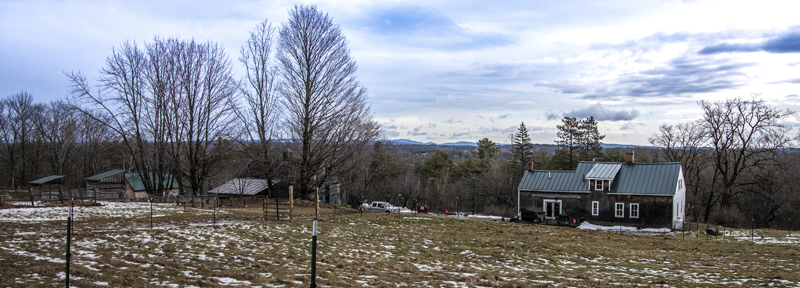
The Camden Hills can be seen from Briggs Farm in Somerville on Jan. 17. Corey and Alicia O’Connell bought the property because they found the acreage they wanted at an affordable price — the view was a bonus. (Bisi Cameron Yee photo)
Corey and Alicia O’Connell opened the farm store at Briggs Farm in August 2020. The couple had moved to Somerville in 2016, inspired by Corey O’Connell’s father, Dwight Briggs, who told them to go find a piece of land. They did as he said. And named it after him.
Originally from Massachusetts, the couple moved north when Alicia O’Connell found a job at L.L. Bean. In Somerville, they found the affordable acreage they were looking for. The town has agriculture-friendly zoning and the community was supportive, so the O’Connells bought the gently sloping 38-acre farm on Jones Road.
The whole idea was meant to be an exercise in homesteading. The O’Connells had no prior experience with farming, and initially only expected to raise their own food. They had chickens and bees. They had a couple of pigs they were raising for meat. But they quickly found that two pigs provided way more meat than was needed to fill the bellies of two people. So they applied for a license to sell products from their farm and decided to make a go of it.
At first they sold their products at farmers markets. Alicia O’Connell said it was a great way to meet locals and get their name out. But she pointed out that customers don’t get to see the farm at farmers markets. “People want to know where their food comes from,” she said. Building their own farm store was the answer.
Early in the pandemic, according to Corey O’Connell, the farm’s phone began to ring off the hook. Fear and confusion, sown by the COVID-19 virus, had delayed shipments of food to grocery stores. Farm-raised meat became a backup source of protein during that time of crisis, when grocery store shelves were often empty. And for many it became a preferred source.
The O’Connells’ farm store came into being in the middle of the pandemic. It opened on Aug. 22, after several months spent converting an existing building into the ideal space. The same supply chain issues that plagued the grocery market impacted the availability of necessary equipment to complete the project.
It took a month to get the small refrigerators that hold cold goods like cheeses, salted caramel Greek yogurt, and kimchi. It took twice the time to find a respirator so Corey O’Connell could safely insulate the walls. Early in the pandemic, respirators were going to front-line medical personnel.
Once the insulation was completed, the rest of the store fell into place. Wide planks and beams line the ceiling, walls, and floor, the distinctively crisp smell of pine infusing the interior air.
Two chest freezers stand along the wall, one filled with Briggs Farm pork and beef, the other with chicken from Maine-ly Poultry. The O’Connells have around 50 laying hens, but found that raising chickens for meat did not provide the return on investment to make the work worthwhile. Corey O’Connell said he’s happy to let Maine-ly Poultry do the work.
There are a couple of display stands for dry goods and staples, jars of Briggs Farm honey on the top shelf. The bees are Alicia O’Connell’s hobby. She keeps 10 hives, with 40,000-60,000 bees in each hive at the height of the summer season. Corey O’Connell said he can’t mow the grass till July because the dandelions are the bees’ first food.
The O’Connells plan to stay with all Maine and Maine-sourced products to supplement their own offerings. They buy pasta and sauces, jams and soaps wholesale from Maine providers.
A table in the middle of the room holds fresh baked goods, most often scones and bagels on the weekend. The farm has a home kitchen license, which provides yet another avenue to fill the shelves.
There is a small selection of vegetables — potatoes, onions, and shallots right now — but the farm has 200 established asparagus plants to look forward to in the spring. Alicia O’Connell is already adjusting plans for planting the 6,000-square-foot garden in order to stock the store. She wants to be able to provide Briggs Farm customers with all the elements of a meal in one visit.
The Belted Galloway cattle that make up the O’Connells’ small herd are known for the quality of their meat. “The beef is phenomenal,” Corey O’Connell said. The relatively rare breed retains body fat better than other breeds. They have a two-layer coat that protects them in winter. “They’re hardy, docile, and disease-resistant.”
Corey O’Connell dreams about breeding registered “Belties.” “They’re just cool to look at,” he said. The O’Connells want to maintain the good genetics of their existing stock while expanding the herd. They want to convert more land into pasture — 3 acres were cleared last summer and they expect to clear more this year.
Their goal is to be able to have as big a herd as their land can sustain. Alicia O’Connell said they want to have a large enough herd to be able to sell half cows in addition to the smaller cuts found in the farm store’s freezers.
The O’Connells have begun to see their work pay off. Customers are finding the farm and appreciating the quality of the local products they sell. They’re seeing new faces, people out on a Sunday drive looking to safely escape the isolation of the pandemic.
“It took the food chain to crash for people to realize that local farms are a valuable resource,” Corey O’Connell said.



